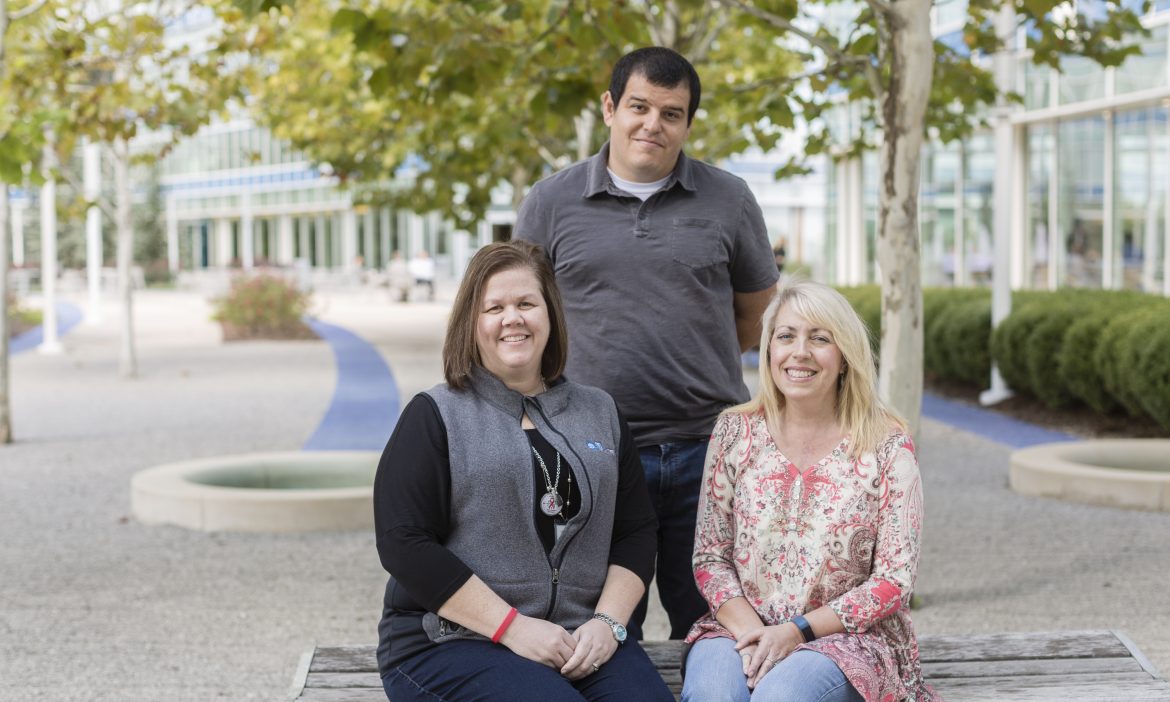Heart disease can happen to anyone. That’s a fact that three BlueCross employees, Justin Lewis, Casie Harmon and Devonna Murray, know all too well.
Ahead of this year’s Tennessee Valley Heart Walk, Justin, Casie and Devonna share their unlikely experiences with heart disease, how they’ve adapted their lifestyles, and why they’re participating in the event to raise money for the American Heart Association.
Heart disease doesn’t take sides – Justin’s story

Justin, a BlueCare third-party claims examiner, was born with congenital heart defects, including two holes in his heart. He had to be revived twice shortly following his birth, and he spent a month in the neonatal intensive care unit, undergoing surgery to repair his heart.
Despite the procedure, doctors noticed that he was developing slower than other children his age.
“There wasn’t enough oxygen getting to my brain and the rest of my body,” Justin says.
The diagnosis this time was severe pulmonary stenosis, a narrowing of the pulmonary valve, which carries blood from the heart to the lungs. Justin underwent open heart surgery at 3 years old to repair the defect.
Today, he lives an almost completely normal life, but he still has constant reminders of his condition.
He has two heart murmurs, his heart can beat faster than normal and the strain his condition puts on the muscle means it is enlarged. He experiences chest pains, as well as palpitations, which can come and go for hours. Annual checkups with his cardiologist include EKGs, ultrasounds, X-rays and stress tests.
Justin has never participated in a heart event, but he’s registered for this year’s Tennessee Valley Heart Walk.
“It was kind of spontaneous,” he says. “I’m not really sure what to expect.”
Justin says that the pains and palpitations he experiences remind him to live each day to the fullest.
“I don’t think people realize how precious life is. Your life could change just like that.”
He encourages people to take charge of their health, get regular checkups and enjoy the everyday experiences that some don’t get to share.
“Heart disease doesn’t care who you are,” he adds. “It doesn’t have sides. A lot of people take life for granted.”
Know your history and your risk – Casie’s story

Casie Harmon, a business analyst in provider resolutions, understands firsthand the importance knowing your family history and trusting your gut when it comes to your health.
“Heart disease runs on both sides of my family, but I didn’t really think about it because you never want to think that it’s going to happen to you,” she says.
2015 was the year her thoughts changed.
Casie started feeling chest pains, which she initially attributed to asthma, which she’s had since she was 5. However, when they became more regular, she started to pay attention.
Casie describes the pain as similar to “a deep bruise that hurts when you touch it.” It started in her chest and radiated up toward her left shoulder. It didn’t sit right with her, so she called her doctor.
After a visit to her primary care physician, Casie had a stress test that came back normal. The pains persisted, and the test results didn’t satisfy her.
“The staff at the Chattanooga Heart Institute told me, ‘If you have a family history, keep pushing,’” she says.
She was transferred to a cardiologist who ordered an arteriogram. The test showed two blockages, and her doctor scheduled bypass surgery. When he opened her up, he found a third blockage.
“One was 50 percent, one was 60, and the other was in the 30-40 range,” Casie says.
For Casie, family history was something she couldn’t ignore.
“If I hadn’t had a family history, I may not have been as persistent.”
“In 2005, my mother had a normal stress test, and a month later, she had a heart attack and needed a quadruple bypass.”
Her father had a stroke, and three of her four grandparents had heart surgery. Casie knows that heart disease doesn’t discriminate.
Her experience with it at a relatively young age has inspired her to participate in this year’s walk and raise awareness for others.
“It’s not an older person’s disease, and it doesn’t just hit people who are overweight – it doesn’t care what you look like or what your age is,” she says. “It’s serious, and if something doesn’t feel right, you need to pursue it.”
‘A walking miracle’ – Devonna’s story

That’s how Emily Capps, RN, a coding and reimbursement research analyst II, describes fellow employee Devonna Murray. And it’s true. On June 21, 2017, Devonna, a financial analyst in BlueCare, suffered an aortic dissection at work.
Aortic dissections are rare but life-threatening, and most happen in men aged 60-70. A dissection occurs when the force of blood moving through the aorta causes the layers of the vessel to split.
That Wednesday morning, Devonna noticed a pain in her chest. It struck her as odd, but not worrisome.
Around 11:30, the pain had moved from her chest to the area between her shoulder blades.
“It was a burning, searing pain,” Devonna says. “My back felt like it was on fire.”
Walking back to the clinic after lunch, she collapsed. Emily, who has a decade of experience in intensive care, happened to be passing by.
“I could tell it was a cardiac event,” Emily says. “She never turned blue, but she was pale and clammy.”
Emily, along with clinic staff and other BlueCross employees, ensured a 911 call was placed and took care of her until the ambulance arrived.
Devonna was transported to Erlanger Hospital, where doctors ruled out a heart attack. The physician on duty happened to specialize in aortic dissections and ordered a CT.
“I lit up like a Christmas tree,” Devonna says.
She underwent surgery to repair her aorta and her carotid artery, which had also shredded. This was followed by four days in the Erlanger ICU, four days in the cardiac step-down unit, cardiac rehabilitation and weekly home health visits. She was out of work for 12 weeks and returned on Sept. 14.
This year, Devonna will be participating in her first Tennessee Valley Heart Walk.
“I don’t know if I can walk the entire distance, but I’ll be there,” she says.
She’s looking forward to sharing the day with others who have been affected by cardiac events and heart disease.
“It doesn’t matter if you work out and eat healthy,” Devonna says.
“I didn’t fit the typical profile for someone with an aortic dissection.”
“I’m not a man. I didn’t have high blood pressure. The only thing they can attribute it to is family history. My mother had an abdominal aortic aneurysm. I’m hoping to raise awareness.”
Be proactive and stay healthy
Justin, Casie and Devonna echoed one sentiment – heart disease can strike anyone at any age. Heart disease and stroke are the No. 1 and No. 5 killers of Americans, and the best way to prevent them is to know your risk factors (including family history, high blood pressure and high cholesterol), eat a balanced diet and stay active. Get regular checkups with your doctor to detect underlying conditions that may put you at risk, and if something doesn’t feel right, get it checked out.
To join Justin, Casie and Devonna in raising money for cardiovascular research and the American Heart Association, donate to the Tennessee Valley Heart Walk.


 Amanda joined the BlueCross BlueShield of Tennessee corporate communications team in 2017. Born and raised in Chattanooga, she has a decade of experience in writing for print and the web, as well as digital marketing.
Amanda joined the BlueCross BlueShield of Tennessee corporate communications team in 2017. Born and raised in Chattanooga, she has a decade of experience in writing for print and the web, as well as digital marketing.